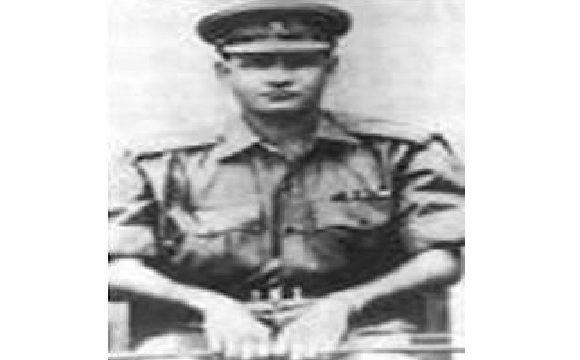
Service No : IC-4282
Date of Birth : September 15, 1922
Place of birth : Delhi
Service : Army
Last Rank : Lieutenant Colonel
Unit : 4 Madras
Arm/Regt : The Madras Regiment
Operation : Op Riddle
Awards : Maha Vir Chakra
Martyrdom : September 8, 1965
Lt Col Harbans Lal Mehta MVC
Lieutenant Colonel Harbans Lal Mehta hailed from Delhi and was born on 15 September 1922. He was the son of Shri D. C. Mehta, who instilled in him values of discipline and service. Growing up in the capital city, young Harbans Lal showed a keen interest in academics and leadership. He pursued his higher education at DAV College, an institution known for shaping many future leaders in various fields. His formative years laid the foundation of his sense of responsibility, patriotism, and determination to serve the nation. With India’s independence on the horizon and the call of duty echoing across the country, he chose a career in the Armed Forces. He joined the Indian Army on 15 December 1946, at the age of 24, just months before India gained independence.
After completing his rigorous military training, he was commissioned into the 4th Battalion of the Madras Regiment (4 Madras). The Madras Regiment is one of the oldest and most illustrious infantry regiments of the Indian Army, renowned for its gallantry and distinguished service in multiple campaigns. Lt Col Mehta imbibed the ethos of the regiment and quickly became known for his commitment to duty, clarity of thought, and leadership skills. Over the years, through his professional competence and exemplary service, he rose steadily in the Army ranks. By 1965, nearly two decades after joining the Army, he had attained the rank of Lieutenant Colonel—a testimony to his distinguished career. That year, he was entrusted with one of the most prestigious responsibilities in an infantry officer’s career: he was appointed as the Commanding Officer (CO) of 4 Madras Battalion. As the CO, Lt Col Mehta bore the responsibility of not only leading his men in operational duties but also nurturing them as a cohesive fighting unit, instilling discipline, and ensuring their readiness for any eventuality.
Indo-Pak War (Sialkot Sector) : 08 Sep 1965
By 1965, Lieutenant Colonel Harbans Lal Mehta had assumed command of the 4th Battalion of the Madras Regiment (4 Madras). As tensions between India and Pakistan escalated into a full-scale war, his unit was deployed in the western sector, one of the most fiercely contested fronts. On the night of 08 September 1965, as part of the Indian Army’s larger offensive in the Sialkot Sector, 4 Madras was assigned the formidable task of capturing Maharajke, a heavily defended enemy position. Around 0200 hours, under the determined leadership of Lt Col Mehta, the battalion crossed the Cease Fire Line (CFL) and commenced its advance. The progress of 4 Madras was soon checked by stubborn enemy resistance. The Pakistani defenses were strong, with well-prepared trenches and interlocking fields of fire that inflicted casualties on the advancing Indian troops. Assessing the tactical situation swiftly, Lt Col Mehta decided not to risk a broad frontal attack. Instead, he ordered his officers to clear the enemy positions trench by trench.
The battle that followed was brutal and close-quarter. Under the resolute guidance of their Commanding Officer, the men of 4 Madras fought with extraordinary courage. They destroyed several enemy gun positions, overran trenches, and inflicted heavy casualties on the defenders. Yet, despite the battering, the enemy refused to yield, and with daylight approaching, the window for success was narrowing. At this critical juncture, Lt Col Mehta realized that one of his reserve companies had been pinned down by unexpected opposition from the flank, threatening the momentum of the attack. Recognizing that delay could jeopardize the entire mission, he made a decision that epitomized his character as a leader.
Disregarding his own safety, Lt Col Mehta personally moved forward to lead the assault. His very presence at the frontlines galvanized his men. Inspired by his fearlessness and determination, the soldiers pressed home the attack with renewed vigour. The momentum of the assault eventually broke through the enemy’s stronghold, and the defenses of Maharajke collapsed under the relentless charge. In the midst of the fierce exchange of fire, Lt Col Mehta was struck by enemy bullets and sustained grievous injuries. True to his indomitable spirit, he continued to direct the operation until he collapsed. Despite being evacuated, he succumbed to his wounds on the battlefield. Lt Col Harbans Lal Mehta’s leadership, courage, and supreme sacrifice ensured the success of a critical operation. His men remembered him not only as a valiant soldier, but as a gritty Commanding Officer who led from the front and shared every danger with his troops. For his outstanding bravery, inspirational leadership, and supreme sacrifice, Lt Col Harbans Lal Mehta was awarded the "Maha Vir Chakra", India’s second highest gallantry award.

VIVEK MEHRA
2025 at 10:54 amYour Sacrifice is always remembered for future generations and also in my heart. You did a great job